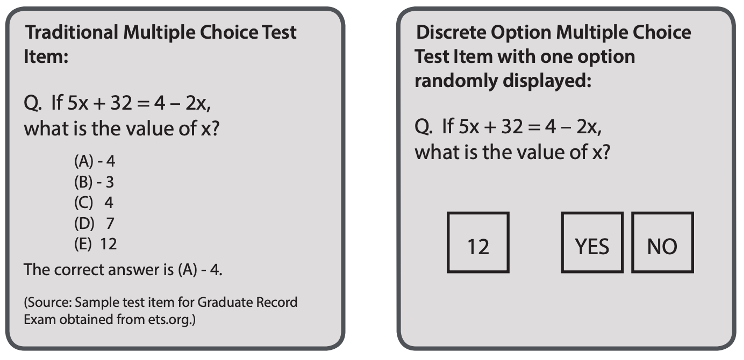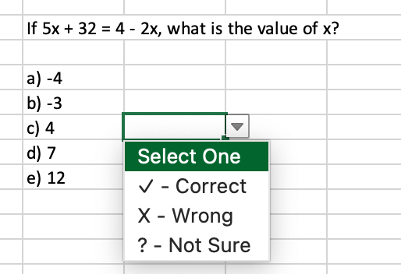One barrier to HyFlex adoption is the time it takes to curate, create, or adapt content for multiple learning modes. In addition, being present in class for multiple modes can be a time challenge. There are learning management system features you can take advantage of and strategies you can employ to take time required for one task to use on another. For example, effective learning requires that learners practice and review content and skills frequently, over time. Combining a mix of system-graded activities and assessments and teacher-graded has several benefits. For low-stake assessments and activities, learners get immediate performance feedback when the activity or assessment is auto-graded. That means learners receive a reality check about their performance and can adjust what they are doing, if needed, or move to the next topic if they are ready. That leaves you time to provide feedback for conceptual or high order thinking activities and assessments.
For no- and low-stakes activities, you may want to consider alternative format multiple-choice question (MCQ) formats that minimize exposing your question pool and offer an opportunity for the learners and you to know what the learners know and do not know. A problem with multiple choice exams, especially publisher-created resources, is that the answers may be available on the Internet. In addition, just because the learner answered the question correctly, they and you do not know if they know why the answer was correct. You also do not know whether they guessed. Alternate MCQ assessment formats are time-consuming to create. However, they are more difficult to copy. The strength of Discrete-Option Multiple-Choice (DOMC) assessments is that the learner may not see all the response options of a question. The protects the question pool and limits the opportunity to guess by eliminating from 4-options. A question is parsed into a multi-question series. While the learner responds correctly, they continue to be presented with questions until they answer a concept correctly. An incorrect response triggers the next question to display. Any tool that permits you to use branch logic can be used to create a DOMC style question. I have used PowerPoint to create practice assessments that generate a diagnostic at the end of the assessment indicating learner strengths and weaknesses regarding the topic. DOMC style questions are easy to create since they are not complex. You can use them longer as they are more difficult to compromise. Some people believe that DOMC questions are more equitable for learners not used to testing or for English as a second language learners.

Number Right Elimination Testing (NRET) is another MCQ format I like to recommend. The Number Right (NR) grading scheme is one in which the students pick one correct option. With Elimination Testing (ET), students must eliminate (cross out) all alternatives that they consider incorrect. NRET assessment require that the learners select from the following options for each question using a drop-down list. They identify each question response as CORRECT, WRONG, or NOT SURE. They must identify one option as “correct” but may identify none, one, two, or three options as “not sure” or “wrong”. There are penalties for misidentification. The biggest penalty is identifying the correct answer as “wrong”.

Correctly identifying the correct answer earns 1-point. Correctly identifying each wrong answer earns 1 point each. For a 4-option multiple-choice question, a learner may earn up to 4-points. If the learner misidentifies the correct response as a wrong answer, they lose 3-points (-3). Learners earn 0-points for a “not sure” response. NRET is an ideal format for teacher that offer unlimited attempts for quizzes used as a content learning strategy
You may create a similar assessment to NRET for multiple-answer format questions using Canvas’ New Quizzes. New Quizzes is supposed to permit partial credit and penalties for multiple-answer questions. NRET is different since it builds in confidence testing. There are two benefits of confidence testing. If the learner identifies what they are unsure about while completing an assessment, then they make informed choices when reviewing to keep an answer or to change it before submitting the assessment. In addition, the grade scheme for NRET reflects the learner’s knowledge level. Again, the traditional MCQ format rewards for guessing correctly. This style assessment not only informs the learner about what they do and do not know well, but you, the teacher. If many students are unsure about a concept, you can remediate as needed. NRET classifies the following knowledge states, FULL KNOWLEDGE, PARTIAL KNOWLEDGE, ABSENCE OF KNOWLEDGE, PARTIAL MISCONCEPTION, and FULL MISCONCEPTION. You can create an NRET assessment in Excel and create a diagnostic summary page. Alternately, you can use the Multiple-Answer question format in Canvas and use the partial credit feature in New Quizzes. The features are less robust or informative than NRET.
A third and final type of alternate MCQ I will present is team-based learning (TBL). As an advocate of testing for learning versus of learning, TBL is a great way to provide learners with several opportunities to demonstrate their topic understanding. Learners complete an independent assessment prior to class, then use team argumentation/discussion to complete a team assessment of the topic, and finally an assessment again individually. By the end of the learning experience, learners should not only be able to answer more questions correctly but understand why one response is more correct over another. We use the Canvas LMS at our institution. When we had Blackboard, I was able to create assessments that supported team-based learning and simulated the IF-AT card format. There are many resources available on these alternate assessment formats. Four are listed below.
Resources:
https://www.youtube.com/watch?v=KcZs3aQ8-64 (TBL)
https://www.youtube.com/watch?v=2vnCMkt0SdU (IF-AT cards)
https://atcm.mathandtech.org/EP2008/papers_full/2412008_15339.pdf (NRET Scoring)
https://caveon.com/wp-content/uploads/2017/02/DOMC-david-foster.pdf (DOMC Scoring)
